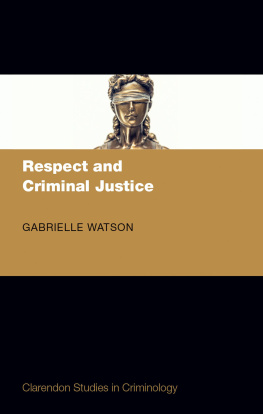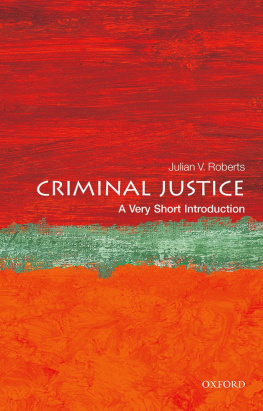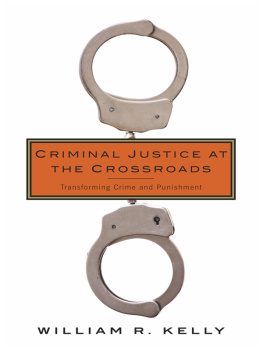The criminal justice system has become a dustbin for failed public policy. This books in-depth and timely consideration of peer mentoring both extends understanding of a crucial participatory approach to this setting and helps offer practical routes out. A must-read text for both professionals and those on the receiving end of criminal justice.
Peter Beresford, Professor of Citizen Participation, University of Essex and Co-Chair, Shaping Our Lives, the national service user-led organization
Peer mentoring in criminal justice has a long history, but a remarkably thin theoretical and research base, considering the rich potential of this work to transform our ideas about criminality and the justice process. Bucks comprehensive treatment of the subject is exactly what is needed, therefore a genuine breakthrough that will become a sort of bible for future research in this area.
Shadd Maruna, Professor of Criminology, Queens University Belfast
Gill Bucks important new book takes our understanding of mentoring to an entirely new level, exploring not just its relationship with desistance from crime but also its complex, contested and emergent role in criminal justice and its reform. In revealing how mentoring interacts with questions of identity, agency, values, change and power, this book will intrigue, inspire and challenge students, practitioners and scholars of criminal and social justice alike.
Fergus NcNeill, Professor of Criminology & Social Work, University of Glasgow
This book takes us beyond aspirational and fashionable approaches to desistance by making a compelling case both critically and in practice for participatory self-determination on the part of those with experience of criminal punishment. In Peer Mentoring in Criminal Justice, Gillian Buck retrieves traditions of radical pedagogy and self-help movements to present a contemporary way forward for sustainable recovery from criminalisation.
Mary Corcoran, Senior Lecturer in Criminology and Director of programmes in Criminology, Keele University
Peer Mentoring in Criminal Justice
Peer mentoring is an increasingly popular criminal justice intervention in custodial and community settings. Peer mentors are community members, often with lived experiences of criminal justice, who work or volunteer to help people in rehabilitative settings. Despite the growth of peer mentoring internationally, remarkably little research has been done in this field. This book offers the first in-depth analysis of peer mentoring in criminal justice. Drawing upon a rigorous ethnographic study of multiple community organisations in England, it identifies key features of criminal justice peer mentoring. Findings result from interviews with people delivering and using services and observations of practice.
Peer Mentoring in Criminal Justice reveals a diverse practice, which can involve one-to-one sessions, group work or more informal leisure activities. Despite diversity, five dominant themes are uncovered. These include Identity, which is deployed to inspire change and elevate knowledge based on lived experiences; Agency, or a sense of self-direction, which emerges through dialogue between peers; Values or core conditions, including caring, listening and taking small steps; Change, which can be a terrifying and difficult struggle, yet can be mediated by mentors and Power, which is at play within mentoring relationships and within the organisations, contexts and ideologies that surround peer mentoring. Peer mentoring offers mentors a practical opportunity to develop confidence, skills and hope for the future, whilst offering inspiration, care, empathy and practical support to others.
Written in a clear and direct style this book will appeal to students and scholars in criminology, sociology, cultural studies, social theory and those interested in learning about the social effects of peer mentoring.
Gillian Buck is Senior Lecturer in Social Work at the University of Chester. Her research interests include peer-led services, criminal justice, youth justice and the voluntary sector. Before working in research and teaching, Gill spent eight years as a Social Worker in a youth offending team.
International Series on Desistance and Rehabilitation
General Editor
Stephen Farrall, University of Derby
Editorial Board
Ros Burnett, University of Oxford
Thomas LeBel, University of Wisconsin-Milwaukee, USA
Mark Halsey, Flinders University, Australia
Fergus McNeill, Glasgow University
Shadd Maruna, Queens University, Belfast
Gwen Robinson, Sheffield University
Barry Godfrey, University of Liverpool
The International Series on Desistance and Rehabilitation aims to provide a forum for critical debate and discussion surrounding the topics of why people stop offending and how they can be more effectively reintegrated into the communities and societies from which they came. The books published in the series will be international in outlook, but tightly focused on the unique, specific contexts and processes associated with desistance, rehabilitation and reform. Each book in the series will stand as an attempt to advance knowledge or theorising about the topics at hand, rather than being merely an extended report of a specific research project. As such, it is anticipated that some of the books included in the series will be primarily theoretical, whilst others will be more tightly focused on the sorts of initiatives which could be employed to encourage desistance. It is not our intention that books published in the series be limited to the contemporary period, as good studies of desistance, rehabilitation and reform undertaken by historians of crime are also welcome. In terms of authorship, we would welcome excellent PhD work, as well as contributions from more established academics and research teams. Most books are expected to be monographs, but edited collections are also encouraged.
Positive Growth and Redemption in Prison
Finding Light Behind Bars and Beyond
Lila Kazemian
Peer Mentoring in Criminal Justice
Gillian Buck
Desistance and Societies in Comparative Perspective
Dana Segev
For more information about this series, please visit: https://www.routledge.com/criminology/series/ISODR
First published 2020
by Routledge
2 Park Square, Milton Park, Abingdon, Oxon OX14 4RN
and by Routledge
52 Vanderbilt Avenue, New York, NY 10017
Routledge is an imprint of the Taylor & Francis Group, an informa business
2020 Gillian Buck
The right of Gillian Buck to be identified as author of this work has been asserted by her in accordance with sections 77 and 78 of the Copyright, Designs and Patents Act 1988.
All rights reserved. No part of this book may be reprinted or reproduced or utilised in any form or by any electronic, mechanical, or other means, now known or hereafter invented, including photocopying and recording, or in any information storage or retrieval system, without permission in writing from the publishers.
Trademark notice: Product or corporate names may be trademarks or registered trademarks, and are used only for identification and explanation without intent to infringe.
British Library Cataloguing-in-Publication Data
A catalogue record for this book is available from the British Library
Library of Congress Cataloging-in-Publication Data







